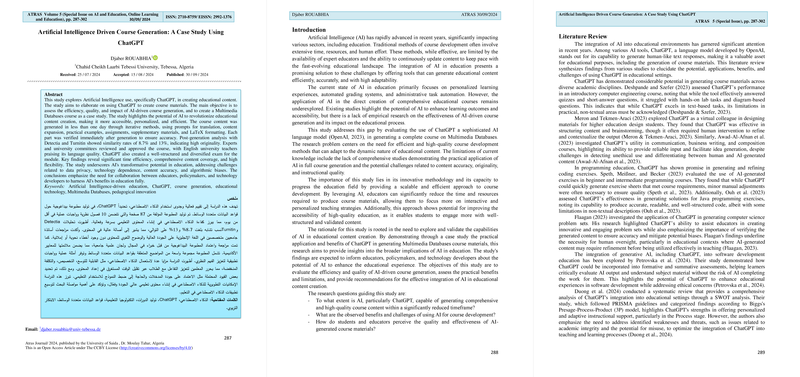AI-Driven Course Generation: Insights from a Case Study with ChatGPT
The paper, "Artificial Intelligence Driven Course Generation: A Case Study Using ChatGPT" by Djaber Rouabhia, examines the capabilities of AI, specifically the ChatGPT LLM, in generating educational content efficiently and effectively. As a detailed exploration into this method of content creation, the paper not only assesses the practicality of employing ChatGPT in course generation but also evaluates its impact on educational systems.
Key Findings
A primary goal of this paper was to explore the feasibility of using ChatGPT to create a comprehensive course on Multimedia Databases. The course, spanning 87 pages and consisting of various chapters and practical assignments, was produced within a single day through an iterative process involving content generation and immediate validation. The low similarity rates (8.7% for Detectia and 13% for Turnitin) illustrate the high originality and uniqueness of the AI-generated content. Expert reviews confirmed the academic rigor, coherence, and linguistic quality of the materials, receiving endorsements from both pedagogical experts and university committees.
Technical Insights
The paper details a systematic methodology where specific prompts guided the AI to translate, expand, and deepen the course content originally presented in French. This structured approach enabled the AI to generate detailed sections, practical examples, and supporting materials. The generated materials were formatted using LaTeX, which further ensured professional presentation. Notably, the AI also contributed to creating a structured and diversified examination for the course module, further showcasing its versatility and alignment with educational objectives.
Challenges and Considerations
Despite the promising results, the paper acknowledges limitations inherent in current AI capabilities. Key concerns include potential inaccuracies or biases within AI-generated content, the dependence on prompt quality for optimal output, and ethical considerations around AI's role in education. While AI can generate high-quality content efficiently, critical oversight by human educators remains essential to ensure contextual relevancy and creativity in the material.
Practical and Theoretical Implications
This paper presents several implications for the field of educational technology. The ability of ChatGPT to generate course content rapidly can significantly alleviate the resource constraints often faced by educational institutions, particularly those lacking subject-matter experts. Additionally, automating course creation could allow educators to allocate more time to interactive teaching and personalized student engagements. On a theoretical level, the integration of AI-driven methodologies may stimulate new research into adaptive learning technologies, focusing on personalized content delivery and student-specific learning trajectories.
Future Directions
The findings of this paper open several avenues for future research and development. The potential for AI to contribute to content generation across various disciplines is vast, and further exploration into specialized AI tools for different educational domains could enhance subject-specific content delivery. Moreover, improving ethical frameworks and guidelines for AI application in education is crucial to maintaining educational integrity and maximizing the positive impact of AI technologies.
In conclusion, the use of AI in educational content generation, as demonstrated in Rouabhia's paper, signifies a step forward in the intersection of AI and education. The research effectively illustrates AI's capacity to produce high-quality and scalable educational materials, laying a foundation for additional studies to expand on these processes and address existing challenges.
